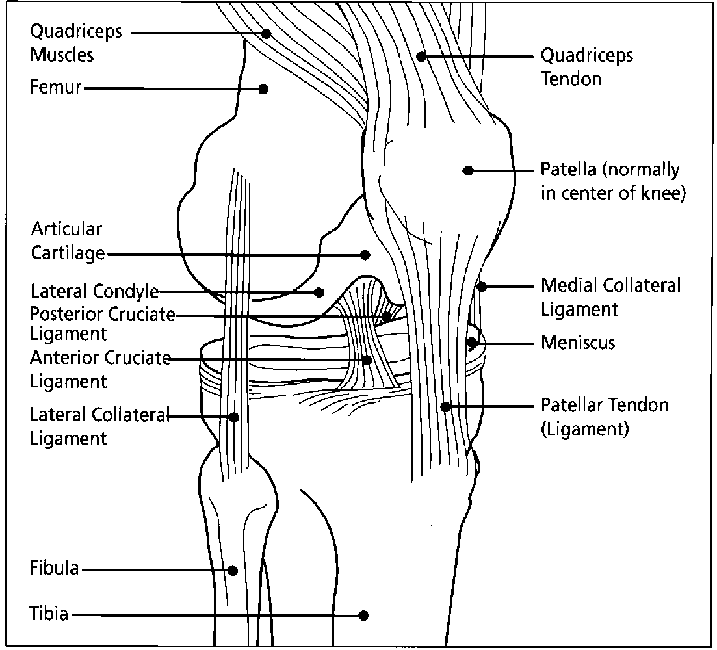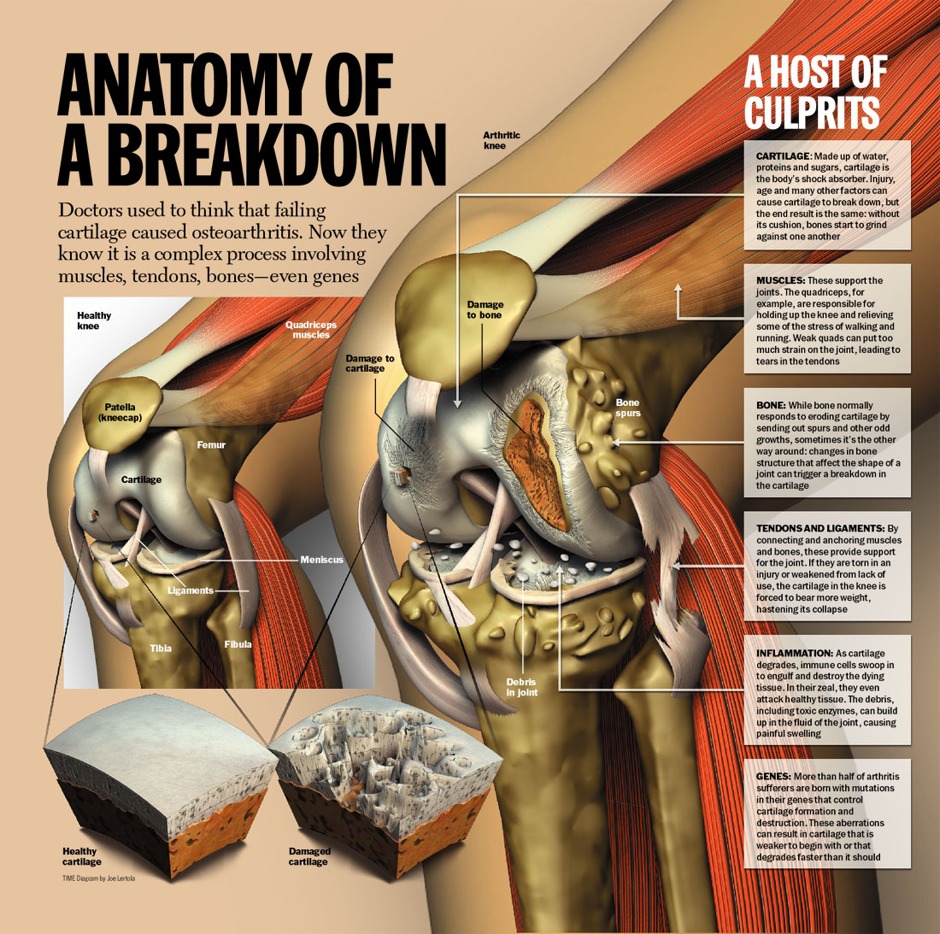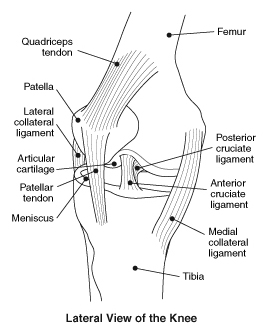
LINKS to KNEE HEALTH Sites
(esp. info-sites on cartilage, bursa,
arthroscopy, and synovectomy)
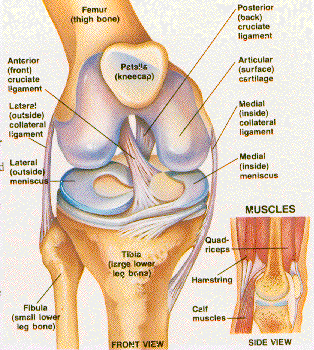

|
LINKS to KNEE HEALTH Sites
(esp. info-sites on cartilage, bursa,
|

|
Home page > This KNEE-HEALTH LINKS page
! NOTE !
Like most 'LINKS' pages on the web, there will, no doubt,
be more and more dead links on this page over time.
It may be years at a time before I return to this page to
remove dead links and replace some links with better links.
In the meantime, try 'WEB SEARCH' links provided on this page.
Table of Contents:(links to sections of this page, below)
Note : 'cartilage' or 'synovectomy' or 'patella'.
End of Table of Contents.
|
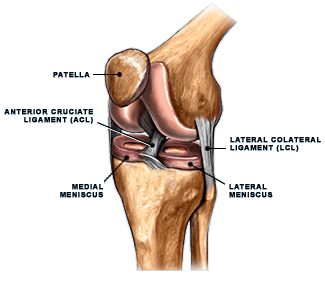
|
|
Where I am coming from ("knee-wise") : I had arthroscopic knee surgery on 1 June 2005, for a (moderately) torn meniscus in my knee --- as shown by an MRI scan. The scan was prompted by many months of intermittent knee pains (even while seated at work) and prompted by a growing inability to play tennis because of crippling pains in my right knee. I had a long and painful "recovery" from the surgery --- but was not recovered even 9 months after the surgery. I experienced excruciating pain in going up and down stairs (especially down). And I frequently had to cover my knee with a cold-pad to help reduce the pain. Whenever the pain got really bad, I had to resort to soaking the knee in an ice water bath, by kneeling in a plastic container filled with water and ice cubes. (It took more than 3 and a half years before I could walk up and down stairs without pain, without holding on to handrails.) The recovery process was probably NOT helped by a nurse, who, after I woke up in the hospital after the surgery, gave me post-op instructions to "put weight on the knee as soon as you can when you get home". (My wife was witness to those instructions.) When I got home, I found I could walk on the knee and even go up and down stairs to the second floor of our house. I thought - "Wow. This arthorscopic surgery is great. Fast recovery." BUT ... The next day, about 24 hours after leaving the hospital, the morphine that they had used to deaden the knee wore off. YOWWW!!! (Noone told us about the morphine, and that it would take about 24 hours to wear off.) I now found it impossible to walk up and down stairs without going one step at a time --- up or down. I could not do it without using the handrails. Apparently that nurse had never experienced knee surgery. In any case, my knee was in heavy pain for several months. It required many ice packs per day to keep the pain under control. And it was about 9 months until I could occasionally walk up and down stairs without holding onto hand-rails. Even then there was frequent, major discomfort that reminded me to use the hand-rails rather than not use them. I am retired. (I retired 6 months before the knee surgery.) But I have been under pressure from my wife to get a part-time job. So at about 10 months after the surgery, I got a job with a Busch Gardens theme park nearby --- a job that required being on one's feet for about 8 to 10 hours per day with only a few breaks. I thought that I could handle it, since there was little or no stair climbing --- and I was limiting myself to working no more than 3 days per week, knowing my knee condition. But pains were returning after long days on my feet, and it seemed that there was a possibility that I was doing damage to the knee. Some of the pain seemed to be from "tweaked" ligaments --- some of the pain seemed to be from "bone grinding on bone" --- and some of the pain seemed to be "point pain" from a particle in the knee joint. A post-op MRI : I returned to the surgeon and got an X-ray, then an MRI (10 Jun2006) --- one year after the knee surgery. The report on the MRI mentioned two knee compartments in which there was "full thickness articular cartilage loss". None of my previous several MRI's on the right knee (in 1993, 2000, and 2004), before the surgery, had ever reported "full thickness cartilage loss". Apparently the (aggressive) surgery caused this. No wonder my knee has been experiencing ligament "tweaks" and "grinding" pain. Apparently, the surgeon removed too much --- even after I thought we had an agreement that he would limit the surgery to simply trimming the torn meniscus. In contrast, he told my wife right after the surgery, at the hospital, that when he got into the knee there was much more to be done than the MRI had shown. Also, his bill for the surgery [that I got months later via my medical insurance company] showed three large billed items (at more than $2,000 each) :
The "debridement" indicates that he removed a lot more than simply trimming the torn meniscus. And the "major synovectomy" indicates that he removed a lot of the tissue that supplies the milky lubricating fluid to the knee. No wonder I was having such a long "recovery period". And full recovery is doubtful. (The 'full thickness articular cartilage loss' will probably never fill in completely.) Actually, rather than "recovery period", I should say --- no wonder I was having such a long "pain period". Because I may never fully "recover" --- but there definitely was a lot of pain --- several years of it. There is a limit to the amount of surgery-damage that Mother Nature (the magical healing processes of the body) can repair. So after a couple of months of work of about 3 days a week at the Busch Gardens job, I had to give it up for the time being. I could not stay on my feet for eight to ten hours without getting pains in the operated-upon knee. Too much of a bad thing : I think my many-years-after-surgery pain-condition is a result of the surgeon being overly-aggressive, surgically-speaking. Simply ... he removed too much. This seems to be corroborated by
I am really disgusted with this surgeon. The U.S. has all these amazing machines (MRI etc.), but when you get in an operating room under general anesthesia, you are at the mercy of "lack of common sense" and "human error" --- if not "human error" by the doctor, then "lack-of-common-sense-error" in the form of poor post-op instructions from a nurse --- piled upon the aggressive decision by the doctor to remove a lot of Mother Nature's protective coating for the knee. It's not nice to fool around with Mother Nature's designs --- designs that she has worked out over thousands of years. Some examples of "lack of common sense" shown by the surgeon, in my case, follow.
Where is the Internet when you need it : I am disgusted with the number of medical errors, the poor procedures, and the poor post-op instructions in our technologically advanced medical system. And I am disgusted with how difficult it is to get ratings of doctors on their types-of-surgeries-per-month and on their surgical success rates (via patient evalutations, that is --- NOT doctors' evaluations of themselves).
Before the operation, I went on the internet to find some information like that, but I could find none --- not just for this doctor, but NO INFO for ANY doctor. The need for patient-reviews sites : We patients need sites for evaluating medical doctors and procedures --- like the buyer-reviews of products at amazon.com. A lot of the reviews would be junk --- but the patients know a lot more about the end-result of procedures-and-protocols than their doctors know. The doctors do not even have the time to listen --- and, when they do listen, they listen through mostly-plugged, self-biased ears. Take a look at the reviews on amazon.com. You can tell the valid reviews from the useless ones or contrived ones, in almost all cases. With all the success people are having with using "wikipedias" (on the web or within companies, to foster communication of useful information), it is time for "wikis" on knee surgeries, hip surgeries, shoulder surgeries, back surgeries, eye surgeries, etc. In particular, I would like to find (or start) a "knee support group" --- one run by patients/victims --- not by doctors, nurses, medical-supply-companies, lobbyists, drug companies, insurance companies, or the like. There is such a site on the web --- in the UK (England) --- www.kneeguru.co.uk. (It may be defunct by the time you try this link. It was a volunteer-run site.) I was not able to find a site like it in the U.S. This is probably partly because the U.S. medical system is a lot more aggressive than European countries in discouraging attempts by patients to establish information databases that are not under the control of doctor or medical-industry organizations. A fellow victim : Coincidentally, about 13 months after my surgery, I found another person who had knee surgery by my knee surgeon --- a man my wife and I have known for years. He worked at the same company where I worked before I retired. His surgery was done about a year or two before my knee surgery. He, too, would not have had the surgery if he had known the outcome. He too is having knee problems --- even 3 years after the surgery, with no resolution in sight. He had a "synovisc" (lubricant) injection about 2 years after the surgery. It helped for about a year. When I found out about his surgery, his synovisc benefits had worn off. I wish I had run into him before I had my surgery. Like him, my knee was feeling pretty good for several days before the surgery. Like him, I was tempted to cancel the surgery. (In hindsight, through better diet and some weight loss and some avoidance of stresses on the knee, the knee would probably have improved significantly --- in spite of the evidence of a meniscal tear.)
[ 2009 Aug update : My poor surgical outcome makes me want to try to track down more patients of this doctor --- and try to get him to change his surgical ways --- or get a warning out to potential victims, that is, surgical patients --- or to my insurance company. This doctor was originally a mechanical engineer before he went to medical school. Perhaps his orientation is to polish the knee surface like a piece of wood furniture, rather than leaving a cartilage 'substrate' on which more cartilage can establish itself over time. I later found out that this doctor does lots of knee replacements. Perhaps this leads him to be very aggressive when doing less drastic knee operations, like 'meniscus trims'. This may be why he would not answer my question about how many meniscus-repair operations he averaged per month --- because he did way more knee-replacements than knee-touch-ups. The poor surgical outcome of our friend makes it seem even more important to do something to help prevent these kinds of outcomes from going on and on and on. Based on our experiences, he and I could feed information into a patient-database. And we could have used such a database a few years ago, to find a top-flight surgeon for our knee surgeries. On the subject of anesthesia and post-op instructions : The poor post-op advice that I got from the nurse ("put weight on the knee as soon as you get home") is an example of the danger of anesthesia (general or local) --- a danger that is not appreciated by doctors and nurses. Anesthesia is a blessing to subdue chronic pain in emergency situations, like war wounds and car accidents. BUT, in a surgical environment, anesthesia removes the opportunity of the patient to provide feedback to the nurse or doctor when the doctor/nurse may be causing damage --- say, by simply moving the patient in an "awkward" way, or by positioning the patient's body components in an "unfortunate" way. In my case, since the patient (me) was released from the hospital before the LOCAL anesthesia to the knee wore off, it was the patient who was not aware of the damage he could be causing to himself by putting pressures on the knee. The medical saying from the ancients is "At least, do no harm." There is NO appreciation, by most modern American medical practitioners, for what that really means and entails. For one thing, it should mean taking extra special care under GENERAL or LOCAL anesthesia --- whether that care is to be excercised by doctor, nurse, or patient. And, it is the responsibility of the doctor to make sure that the patient is aware of these dangers. If the patient has not had surgery of this type before, he/she will not be aware of the dangers. The "medical professionals" should warn the patient. There was a failure in that regard in this case --- failure by the several nurses involved, and failure by the doctor who was ultimately responsible for the patient outcome and for guiding the nurses. With the availablity of word processors and PC printers nowadays, there is no reason why a post-op instructions sheet could not be made available to the patient --- based on 'best practices' and authored by those in-the-know. That way, there would not be errors caused by 'failures to communicate' by nurses in post-op. On attempting to un-do the surgical harm : I am trying to eat for "powerful health", and I imbibe Knox gelatin and the like to help Mother Nature replace the cartilage that the doctor removed. My intent is to TRY to resolve the instances of "full thickness articular cartilage loss", that were indicated by the MRI --- 12 months post-op. In fact, that one-year-post-op MRI revealed that I STILL have a meniscal tear. So I am eating healthy to try to repair that too. No more knee surgery for me --- and especially not by that surgeon. The friend-with-surgery-by-the-same-doctor is trying glucosamine and the like, in order to find some relief. When he had his "synovisc" injection about a year or 2 after his operation, he did not return to the doctor (my surgeon) who performed his knee surgery. He had his synovisc injection done by a different orthopedic specialist. Once burned, twice shy. We will see how things turn out. I hope to post my "recovery" status here sometime after mid 2007.
[ 2009 Aug update : I have described in a blog page how getting most of the huge amounts of refined sugar, that I was consuming in previous years, out of my diet resulted in recovery of my knees as well as eliminating several other problems (neuropathy = biting sensation in feet, cracks in heels, sickly skin). Finally, in mid 2007, I was able to start jogging again, but my knees were painful, on and off, for another six months or so. And to this day (mid 2009), I occasionally have pains in my right (surgeried) knee. The pains seem to be diminishing year over year. It has been a long recovery. And I still have problems with my back, as described on a back-links page. I am hopeful that by continuing on a diet heavy in foods assembled by Mother Nature --- veggies and fruits, containing sugarS in Mother Nature's packaging, rather than "food" containing refined sugars --- even my back will recover for the most part. ] In conclusion : The American medical system is probably the best resource for relatively good care in the event of trauma, like an auto accident. But for things like "elective" surgery, let the patient beware. (Even in the case of trauma, I hate to think of the medical errors and poor procedures and poor diagnoses that take place. They are simply not so obvious because of the drastic damage of the injury. Almost any care, including poor care, would be an improvement over extreme trauma.) The newspaper articles about the atrociously high medical errors in the American medical system are "right on". And the situation is really disgusting considering that the U.S. medical system per-person-per-year costs are about 2 to 3 times higher than in any other "developed" country. My experiences, outlined above, indicate the medical errors can come in many forms. In the case of my right knee, the errors included
So my advice in choosing a surgeon is to find one who
There are more
on some other 'external links' pages of this site, labelled : |
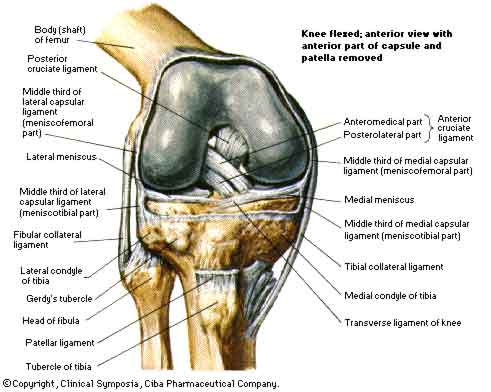
Knee - FORUM sites
< Go to Table of Contents, above. >
|
Knee - CARTILAGE sites & pages
|
Knee - BURSA sites & pages
< Go to Table of Contents, above. >
|
Knee - ARTHROSCOPY sites & pages
< Go to Table of Contents, above. >
|
Knee - SYNOVECTOMY sites & pages
< Go to Table of Contents, above. >
|

Knee - CLINIC sites
< Go to Table of Contents, above. >
|
Knee - SURGERY-INFO sites & pages
< Go to Table of Contents, above. >
|
Knee - HERB / NUTRIENT INFO sites & pages
< Go to Table of Contents, above. >
|
Knee - ARTHRITIS INFO sites & pages
< Go to Table of Contents, above. >
|
Knee - 'WEB DIRECTORY' pages
< Go to Table of Contents, above. >
It seems that 'web directories' are dying out. Google and Yahoo closed theirs down around 2014. Then around 2017, the directory from which the Google and Yahoo web-directories were spawned --- the DMOZ "Open Directory Project" closed down. It seems that it is just not feasible for a team of people to keep up with all the sites that are going dead and the new sites that appear. About a year after the dmoz.org site closed down, it appears that a new web-directory site --- curlie.org --- arose from the ashes of 'dmoz.org'. It remains to be seen how long that web-directory lasts. Following are a few links related to 'web directory' sites.
|
|
Bottom of this
To return to a previously visited web page location, click on
the Back button of your web browser, a sufficient number of times.
OR, use the History-list option of your web browser.
< Go to Table of Contents, above. >
Or you can scroll up, to the top of this page. Page history:
Page was created 2006 May 05.
|
